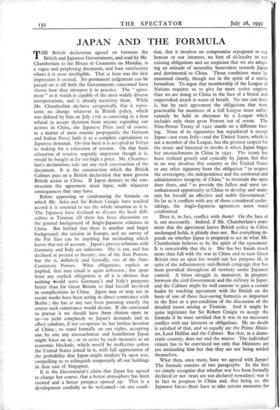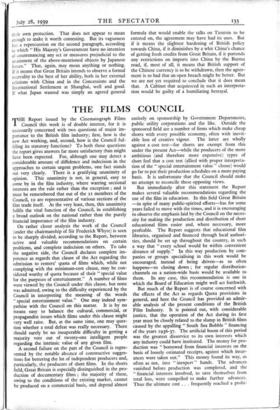JAPAN AND THE FORMULA T HE British declaration agreed on between
the British and Japanese Governments, and read by Mr. Chamberlain to the House of Commons on Monday, is a vague and perplexing document, and least satisfactory where it is most intelligible. That at least was the first impression it created. No permanent judgement can be passed on it till both the Governments concerned have shown how they interpret it in practice. The " agree- ment " as it stands is capable of the most widely diverse interpretations, and is already receiving them. While Mr. Chamberlain declares categorically that it repre- sents no change whatever in British policy, which was defined by him on July 17th as consisting in a firm refusal to accept dictation from anyone regarding our actions in China, the Japanese Press (and of course, as a matter of mere routine propaganda, the German and Italian Press) hails it as a complete capitulation to Japanese demands. On that basis it is accepted in Tokyo as making for a relaxation of tension. On that basis relaxation of tension, urgently important though it is, would be bought at far too high a price. Mr. Chamber- lain's declarations rule out any such construction of the document. It is the construction which the British Cabinet puts on a British declaration that must govern British action in China. If Japan demurs to the con- struction the agreement must lapse, with whatever consequences that may have.
Before approving or condemning the formula on which Mr. Arita and Sir Robert Craigie have reached accord it is essential to see the whole situation as it is. The Japanese have declined to discuss the local diffi- culties at Tientsin till there has been discussion on the general background of Anglo-Japanese relations in China. But behind that there is another and larger background, the tension in Europe, and no survey of the Far East can be anything but misleading which leaves that out of account. Japan's precise relations with Germany and Italy are unknown. She is not, and has declined at present to become, one of the Axis Powers, but she is, definitely and formally, one of the Anti- Comintern Powers. What obligations, explicit or implied, that may entail is again unknown ; but apart from any explicit obligations at all it is obvious that nothing would serve Germany's and Italy's purposes better than for Great Britain to find herself involved in complications in China. Japan may or may not in recent weeks have been acting in direct connivance with Berlin ; she has at any rate been pursuing exactly the course such connivance would dictate. If she continued to pursue it we should have three choices open to us—to yield completely to Japan's demands and in effect condone, if not co-operate in, her lawless invasion of China ; to stand formally on our rights, accepting one by one any encroachment and humiliation Japan might force on us ; or to resist by such measures as an economic blockade, which would be ineffective unless the United States joined in it, with full appreciation of the probability that Japan might retaliate by open war, compelling us to relinquish temporarily all our holdings in Asia east of Singapore.
It is the Government's claim that Japan has agreed to change her course, that a better atmosphere has been created and a better prospect opened up. That is a development cordially to be welcomed—on one condi- tion, that it involves no compromise repugnant to our honour or our interests, no hint of disloyalty to our existing obligations and no suspicion that we are adopt- ing an attitude of neutrality benevolent towards Japan and detrimental to China. Those conditions must be examined closely, though not in the spirit of a sterile formalism. To argue that membership of the League of Nations requires us to give far more active support than we are doing to China in the face of a brutal and unprovoked attack is waste of breath. No one can deny it, but by tacit agreement the obligations that were practicable for members of a full League must unfor- tunately be held in abeyance by a League which includes only three great Powers out of seven. The Nine-Power Treaty of 1922 stands on a different foot- ing. None of its signatories has repudiated it except Japan—not even Italy—and the United States, which is not a member of the League, has the greatest respect for the treaty and hastened to invoke it when Japan began her encroachments in China in 1931. The treaty has been violated grossly and cynically by Japan, but that in no way absolves this country or the United States or any other signatory from the obligation "to respect the sovereignty, the independence and the territorial and administrative integrity of China," to maintain the open door there, and "to provide the fullest and most us- embarrassed opportunity to China to develop and main- tain for herself an effective and stable Government." So far as it conflicts with any of those considered under- takings, the Anglo-Japanese agreement must stand condemned.
Does it, in fact, conflict with them? On the face of it, not necessarily. Indeed, if Mr. Chamberlain's state- ment that the agreement leaves British policy in China unchanged holds, it plainly does not. But everything de- pends on whether Japan is prepared to act in what Mr. Chamberlain believes to be the spirit of the agreement. It is conceivable that she is. She has her hands much more than full with the war in China and to turn Great Britain into an open foe would suit her purpose ill, in spite of the inflammatory anti-British campaign that has been provoked throughout all territory under Japanese control. A bitter struggle is, moreover, in progress between the civil Government and the military in Japan, and the Cabinet might be well content to gain a certain kudos by reaching agreement with the British on the basis of one of those face-saving formulas so important in the East as a pre-condition of the discussion of the detailed issues arising at Tientsin. And it might be quite legitimate for Sir Robert Craigie to accept the formula if he were satisfied that it was in no necessary conflict with our interests or obligations. He no doubt is satisfied of that, and so equally are the Prime Minis- ter, Lord Halifax and the Cabinet. But that, in a demo- cratic country, does not end the .matter. The individual citizen has to be convinced not only that Ministers are not misleading him but that they are not being misled themselves.
What then, once more, have we agreed with Japan? The formula consists of two paragraphs. In the first we simply recognise that whether war has been formally declared or not (wars are not declared nowadays) war is in fact in progress in China and, that being so, the Japanese forces there have to take certain measures for their own protection. That does not appear to mean enough to make it worth contesting. But its vagueness his a repercussion on the second paragraph, according to which "His Majesty's Government have no intention of countenancing any act or measures prejudicial to the attainment of the above-mentioned objects by Japanese forces." That, again, may mean anything or nothing. If it means that Great Britain intends to observe a formal neutrality to the best of her ability, both in her external relations with China and in the Concessions and the International Settlement at Shanghai, well and good. If what Japan wanted was simply an agreed general formula that would enable the talks on Tientsin to be entered on, the agreement may have had its uses. But if it means the slightest hardening of British policy towards China, if it diminishes by a whit China's chance of getting fresh credits from Great Britain, if it portends any restrictions on imports into China by the Burma road, if, most of all, it means that British support of the Chinese currency is to be withdrawn, then the agree- ment is so bad that an open breach might be better. But we are not yet required to conclude that it does mean that. A Cabinet that acquiesced in such an interpreta- tion would be guilty of a humiliating betrayal.









































 Previous page
Previous page